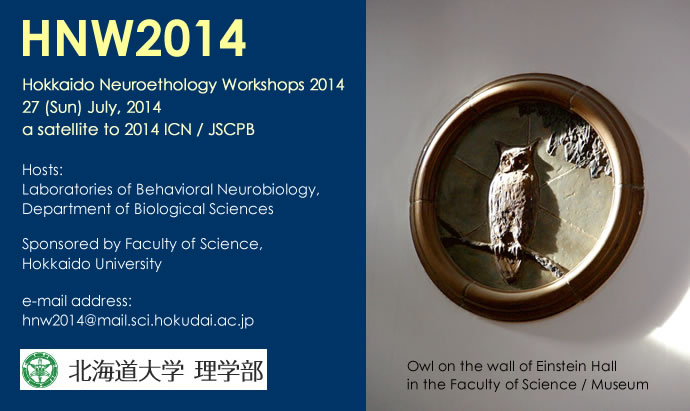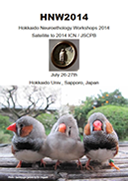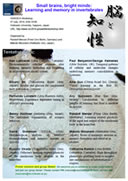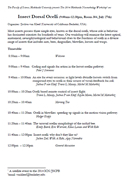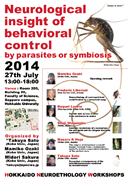Hokkaido Neuroethology Workshops 2014 (HNW2014)
Hokkaido Neuroethology Workshops 2014 (HNW2014) will be held on July 26/27th 2014 at the Faculty of Science, Hokkaido University Sapporo Campus as a satellite event to the 2014 ICN/JSCPB. Currently, following 8 workshops are planned for HNW2014. All registered participants of the 2014 ICN/JSCPB are welcome to attend these workshops with no additional fee. For further information and details of the program, please contact the primary organizers of each workshop (marked as *). For any other inquiries about the HNW2014, contact us at: hnw2014@mail.sci.hokudai.ac.jp.
(Toshiya Matsushima / Hitoshi Aonuma / Makoto Mizunami)
The workshops program is available for download
Workshops (*organizer contact address)
On 26 July
- 1. Birdsong and imprinting (14:00-18:00, Room 203)
- Organized by *Brian McCabe (Univ Cambridge, UK), Johan J. Bolhuis(Univ Utrecht, Holland) and Kazuo Okanoya (Univ Tokyo, Japan).
Speakers/Chairs: Johan J Bolhuis (Utrecht Univ, Netherlands), Kazuo Okanoya (Univ Tokyo, Japan), Alister Nicol (Cambridge Univ, UK), Shigeru Watanabe (Keio Univ, Japan), Brian McCabe (Cambridge Univ, UK).
The workshop is designed to stimulate discussion across multiple levels of analysis - behavioural through molecular - with the aim of identifying fundamental features of early learning. All ICN/JSCPB conference and IBRO Neuroethology Advanced School participants are welcome. Format: Poster display before start of workshop/ Keynote talks/Poster session/refreshments/Oral presentations of new results/General discussion/ Informal group dinner (optional, charged). Please see our website http://www2.zoo.cam.ac.uk/birdsongworkshop2014/index.html or send email to BMcC.
On 27 July
- 2. Amphibian neuroethology workshop (9:00-18:00, Room 301).
- Organized by *Ian Hall (Columbia Univ, USA), James Carr (Texas Technical Univ, USA) and Kim Hoke (Colorado State Univ, USA).
Speakers: Ikkyu Aihara (RIKEN, Japan), Phil Bishop (Univ Otago, New Zealand), Edward Gruberg (Temple Univ, USA), Yuxiang Liu (UNC, USA), Peter Narins (UCLA, USA), Detlev Schild (Univ Göttingen, Germany), Keith Sillar (St Andrews Univ, UK), Andrea Simmons (Brown Univ, USA), Molly Womack (Colorado State Univ, USA), Erik Zornik (Reed Univ, USA)
Visit our website: http://jamescar7.wix.com/amphibneuroethology-
- 3. Dynamic analysis of biosonar and predator-prey interactions (9:00-18:00, Room 206)
- Organized by *Hiroshi Riquimaroux (Doshisha Univ, Japan).
Speakers: Hana Tsuji (Doshisha Univ, Japan), Mel Wohlgemuth (Univ Maryland, USA), Laura Kloepper (Brown Univ, USA)
Echolocation in bats involves dynamic changes in signals, processing, perception, and interaction with targets, including active countermeasures of potential prey. The vulnerability of bats to countermeasures and the counter-countermeasures of bats reveal important aspects of biosonar processing in neuroethologically-motivated studies that are not manifested in studies motivated by conventional auditory questions. Visit our website: http://neuro.doshisha.ac.jp/HNW2014/hnw2014_riquimaroux.htm
- 4. Small brains, bright minds: Learning and memory in invertebrates (9:00-18:00, Room 203)
- Organized by
*Randolf Menzel (Free Univ Berlin, Germany) and *Makoto Mizunami
(Hokkaido Univ, Japan).
Speakers: Ken Lukowiak (Univ Calgary, Canada), Etsuro Ito (Tokushima Bunri Univ, Japan), Fernando Locatelli (Univ Buenos Aires, Argentina), Benny Hochner (Hebrew Univ, Israel), David Glanzman (UCLA, USA), Ryuich Okada (Tokushima Bunri Univ, Japan), Paul Benjamin/George Kemenes (Univ Sussex, UK), Aike Guo (China Acad Sci, China), Avy Susswein (Bar Ilan Univ, Israel), Randolf Menzel (Freie Univ Berlin, Germany), Makoto Mizunami (Hokkaido Univ, Japan), Catharine Rankin (Univ British Columbia, Canada).
Invertebrate nervous systems offer significant advantages for multidisciplinary molecular, cellular, genetic and behavioral investigations of the mechanisms underlying learning, memory formation and memory retrieval. The workshop is aimed at stimulating discussion on future development of studies on invertebrate learning and memory. We invite you to join our group dinner and welcome young scientists to contribute poster presentations: Send e-mail to RM and MM.
- 5. Ethology, neuroscience and genetics in crickets: How can they meet? (9:00-18:00, Room 201)
- Organized by *Gerald Pollack (McGill Univ, Canada), Berthold Hedwig (Univ Cambridge, UK), and Stefan Schöneich (Univ Cambridge, UK).
Speakers: Berthold Hedwig (Univ Cambridge, UK), Sumihare Noji (Tokushima Univ, Japan), Rohini Balakrishnan (Bangalore Univ, India), Matthias Hennig (Humboldt Univ, Germany), Stefan Schöneich (Univ Cambridge, UK), Hiroto Ogawa (Hokkaido Univ, Japan), Paul Stevenson (Leipzig Univ, Germany), Kenji Tomioka (Okayama Univ, Japan), Hadley Horch (Bowdoin Univ, USA), Taro Mito (Tokushima Univ, Japan), Cassandra Extavour (Harvard Univ, USA), Hans Hofmann (University of Texas, USA)
Visit our website: http://www2.zoo.cam.ac.uk/cricketworkshop2014/index.html
- 6. Evolution of social cognitive ability based on neural coding of fictive and other's outcomes (9:00-18:00, Room 305)
- Organized by *Kenji Matsumoto (Tamagawa Univ, Japan).
Speakers: Michael Platt (Duke Univ, USA), Hiroshi Abe (NCNP, Japan), Shinya Yamamoto (Kyoto Univ, Japan), Ryuta Aoki (Tamagawa Univ, Japan)
Poster session: send e-mail to KM.
Visit our website: http://www.tamagawa.ac.jp/teachers/matsumot/hnw2014/
- 7. Insect dorsal ocelli (9:00–12:30, Room 304)
- Organized by *Joshua van Kleef (Univ California Berkley, USA).
Speakers: Emily Baird (Lund University), Holger Krapp (Imperial College London), Travis Massey(University of California Berkeley),Peter Simmons (Newcastle University), Joshua van Kleef (University of California Berkeley), Jochen Zeil (Australian National University).
Most insects possess three simple eyes, known as the dorsal ocelli, whose role in behavior has fascinated scientists for hundreds of years. Our workshop will examine the latest optical, anatomical, neurophysiological and behavioural clues to the functions of ocelli in a diverse range of insects that includes ants, bees, dragonflies, blowflies, locusts and wasps.
- 8. Neurological insight of behavioral control by parasites or symbiosis (13:00-18:00, Room 205)
- Organized by *Takuya Sato (Kobe Univ, Japan), Mamiko Ozaki (Kobe Univ, Japan) and Midori Sakura (Kobe Univ, Japan).
Speakers: Mamiko Ozaki (Kobe Univ, Japan), Frederic Libersat (Ben Gurion Univ, Israel), David P Hughes (Pennsylvania State Univ, USA), Shuji Shigenobu (NIBB, Japan), Masaru K Hojo (Kobe Univ, Japan), Takuya Sato (Kobe Univ, Japan)
In this symposium session, we show the possible mechanisms of a host behavioral control by comparing strategies associated with different parasites or symbionts and their potential roles in ecosystem processes. We are aiming to provide novel insights into parasite/symbionts-host interaction, that integrate across different levels of biological organization; gene expression-nervous system-altered behavior-ecosystem processes.
Services
Laboratories of Behavioral Neurobiology / Faculty of Science, Hokkaido University will serve you the venue (lecture rooms), facilities (projectors and poster boards), a cloak, free WiFi, coffee and light snacks free of charge. Meal and childcare services will not be available. Lunch is available in nearby campus cafeteria (Chuo Shokudo, 11:00-15:00). For social events, if any, please contact the organizer of each workshop.
Venue
Nine lecture rooms in the Faculty of Science (Bldg.5, 2nd to 3rd floor) will be open for HNW2014, together with a hall for poster session (1st floor). For access to the Sapporo campus please visit our maps.
Map of the Hokkaido University:http://www.oia.hokudai.ac.jp/maps/?p=sapporo
Access to the Sapporo Campus:
http://www.oia.hokudai.ac.jp/about/visitors-access-maps/sapporo-campus-map/


